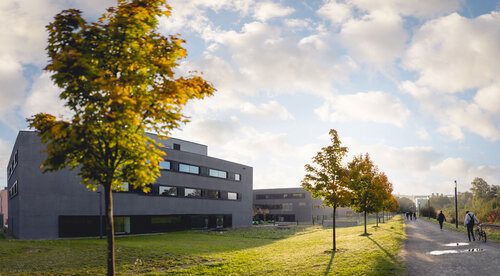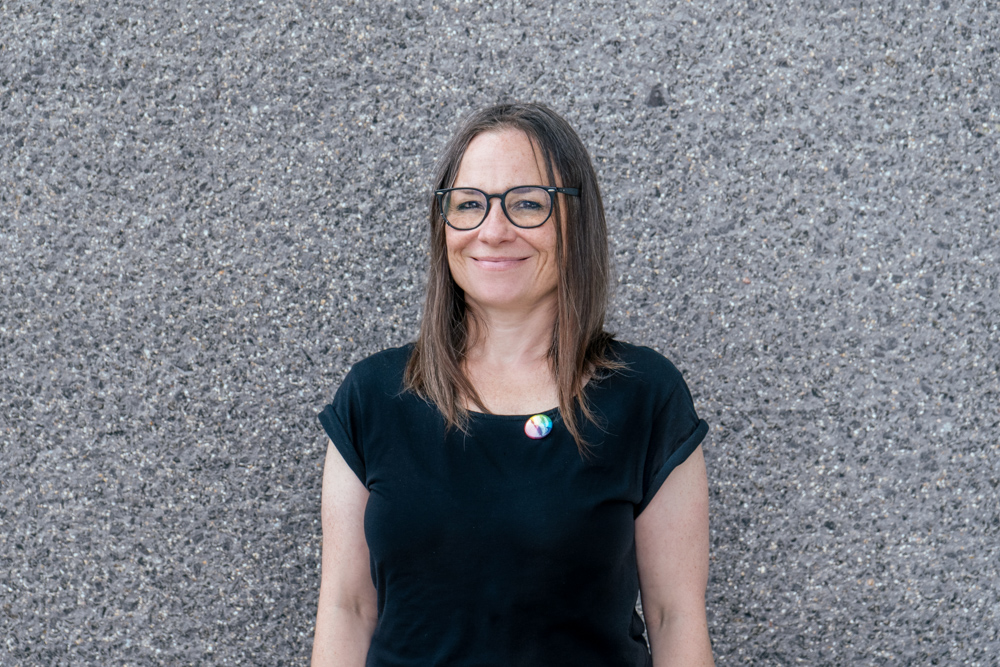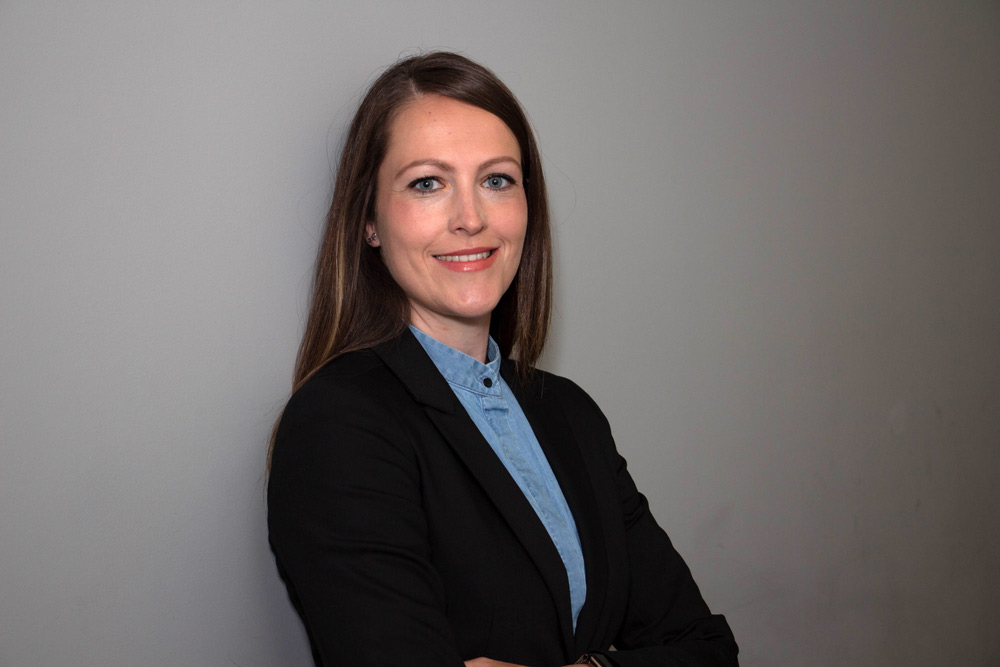11. DAY OF research (2024)
12.03.2024

11th Day of Research (2024)
12.03.2024
After having been a pure online event for five years, the 11th Day of Research was held again at the Deggendorf campus on March 12th 2024.
The keynote was presented by Prof. Dr.-Ing. Andreas Grzemba, the former Vice President Research & Knowledge Transfer. Afterwards eight selected junior scientists were faced with the challenge of presenting their current research projects in no more than four minutes and such that even non-specialists could understand what they are working on.
Like every year, the topics were rather multifaceted. They included: digital transformation and sustainability for a successful intercommunal future in the rural Alpine region, transcriptional regulation in malignant melanoma, the attribution of cyberattacks through AI-supported intrusion detection with alert correlation in industrial networks, the development of processes for the production of sustainable glass, electromobility through interoperable and safe architectures, the evaluation of the relationship between the tumor-stroma ratio and the Ki-67 and p53 status in ductal adenocarcinoma, the improvement of the reliability of conductive atomic force microscopy (CAFM) and an automated post-processing station for powder-based 3D printing.
In addition, six workshops on different topics (see programme) were offered in parallel from 3:30 pm to 4:30 pm. Their aim was to expand networks with partners from professional practice and to facilitate knowledge transfer as an opportunity for mutual exchange.
As a tradition, the Best Presentation Award waited to be claimed. Laura Lemberger from the research team around Prof. Dr. Silke Haerteis, Prof. Dr. Christina Hackl and Prof. Dr. Thiha Aung from the Faculty of Applied Health Sciences was this year`s lucky winner of the glass trophy. She wowed the audience with her well-illustrated and fascinating presentation of the project "The prognostic role of the TSR in PDAC ‒ evaluation of the relationship between the tumor-stroma ratio and the Ki-67 and p53 status in ductal adenocarcinoma".
24 posters competed for the top three places in the Best Poster Competition. Nils Rabeneck from the TC Hutthurm with "AutoClean", Mahboubeh Tajmirriahi from the TC Vilshofen with "ELISA" and Lukas Schmidbauer from the Health Campus Bad Kötzting with his poster "Perception of caregivers on AI" won vouchers from Bücher Pustet. Once again this year, the posters had been designed according to the principle "One picture, one caption ‒ research at one glance!" All 24 posters are available in the form of a sheet version or listed individually by project below.
- 13:30 Opening and greetings
- 13:40 Keynote
- 14:00 Short presentations
SEMIARID - Natural Language Semantic Search in Big Data
Johannes Reisinger, Zineddine Bettouche, Prof Dr Andreas Fischer (Faculty of AI)
Digital Alpine Village - digital transformation and sustainability hand in hand for a successful intermunicipal future in the rural Alpine region
Frank Edenharter (TC Grafenau)
Transcriptional regulation in malignant melanoma - Molecular mechanisms of differential transcriptional activity of AP-1 factors c-Jun, Fra-1 and ATF-2, and their functional significance in malignant melanoma
Zubeir El Ahmad, Prof Dr Melanie Kappelmann-Fenzl (Faculty AI)
CAIDAN - Cyberattack Attribution Using AI-Enhanced Intrusion Detection with alert Correlation in Industrial Networks
Santosh Kumar Nataraj, Andreas Urmann, Prof. Dr Michael Heigl (TC Vilshofen)
GreenGlass 4.0: Development of production processes for the production of sustainable glass
Andreas Hanninger (TAZ Spiegelau)
ELISA - Electromobility through interoperable and secure architectures
Mahboubeh Tajmirriahi, Enrico Weigelt, Stephan Zitzlsperger, Simon Rudhart, Prof. Dr Martin Schramm (TC Vilshofen)
The prognostic role of TSR in PDAC - Evaluation of the relationship between tumour-stroma ratio and Ki-67 and p53 status in ductal adenocarcinoma
Laura Lemberger, Prof. Silke Haerteis, Prof. Dr Thiha Aung, Prof. Dr Christina Hackl (Faculty AGW)
Improving the Reliability of Conductive Atomic Force Microscopy (C-AFM)
Jonas Weber (Institute for Quality and Material Analyses)
AutoClean - Automated post-processing station for powder-based 3D printing
Nils Rabeneck, Eva-Maria Menges, Martina Schöll, Marc Luger (TC Hutthurm); Yuvesh Aubeeluck, Michael Schall, Thomas Benesch, Andreas Eckl, Rami El Smaili (TC Cham)
- 14:55 Pause und Postersession
DIGITAL TECHNOLOGIES
Semantic Clustering of Transformed Process Mining - Transforming Process Mining: A Transformer-Based Approach to Semantic Clustering in Event Log Analysis
Zineddine Bettouche, Johannes Reisinger, Nicki Bodenschatz, Prof Dr Andreas Fischer (Faculty of AI)
CAIDAN - Cyberattack Attribution Using AI-Enhanced Intrusion Detection with alert Correlation in Industrial Networks
Santosh Kumar Nataraj, Andreas Urmann, Prof. Dr Michael Heigl (TC Vilshofen)
SEMIARID - Natural Language Semantic Search in Big Data
Johannes Reisinger, Zineddine Bettouche, Prof. Dr Andreas Fischer (Faculty of AI)
Digital Alpine Village - digital transformation and sustainability hand in hand for a successful intermunicipal future in the rural Alpine region
Frank Edenharter (TC Grafenau)
jbDATA - just better DATA - efficient and characteristic data generation
Gautam Savaliya, Michael Schötz, Patrick Kühnel, Prof. Thomas Limbrunner (TC Plattling); Robert Aufschläger, Prof. Dr Michael Heigl (TC Vilshofen)
XLRoboCT - Dual robot CT for the digitisation of large objects
Felix Lehm (TC Plattling CT)
ELISA - Electromobility through interoperable and safe architectures
Mahboubeh Tajmirriahi, Enrico Weigelt, Stephan Zitzlsperger, Simon Rudhart, Prof Dr Martin Schramm (TC Vilshofen)
Virtual nature experience - "Digital Alpine Village" living lab - "Virtual nature experience" project Experience orchards and bees digitally
Tobias Ruscheinski (TC Grafenau)
SMART MATERIALS
AutoClean - Automated post-processing station for powder-based 3D printing
Nils Rabeneck, Eva-Maria Menges, Martina Schöll, Marc Luger (TC Hutthurm); Yuvesh Aubeeluck, Michael Schall, Thomas Benesch, Andreas Eckl, Rami El Smaili (TC Cham)
GreenGlass 4.0: Development of production processes for the production of sustainable glass
Andreas Hanninger (TAZ Spiegelau)
Improving the Reliability of Conductive Atomic Force Microscopy (C-AFM)
Jonas Weber (Institute for Quality and Material Analyses)
SUSTAINABLE PRODUCTION &ENERGY TECHNOLOGIES
Nature4Nature - Inspired to Integrate: Filtering Nature's Diversity for Nature-friendly Implementations
Jindong Zhang, Kirsten Wommer, Kathrin Stadler, Prof. Dr. Kristina Wanieck (TC Freyung)
QUALITIY OF LIFE& HEALTHCARE
SMART FOREST - Investigation of transport in clinical care
Domenic Sommer, Prof Dr Florian Wahl (TC Grafenau)
Transcriptional regulation in malignant melanoma - Molecular mechanisms of differential transcriptional activity of AP-1 factors c-Jun, Fra-1 and ATF-2, and their functional significance in malignant melanoma
Zubeir El Ahmad, Prof. Dr Melanie Kappelmann-Fenzl (Faculty AI)
Perceptions, experiences and knowledge of nursing staff towards artificial intelligence: results of an online cross-sectional survey in Germany
Lukas Schmidbauer, Domenic Sommer (Health Campus Bad Kötzting & TC Grafenau)
The role of FOXO1 and microRNA21 in the angiogenesis of dCCA and PDAC - The chorioallantoic membrane model to study the importance of FOXO1 and microRNA21 in the angiogenesis of distal cholangiocarcinoma and pancreatic cancer, and to cultivate distal cholangiocarcinoma for chemotherapeutic testing
Agata Montagner, Andreas Ettner-Sitter, Prof. Dr Thiha Aung, Prof. Dr Christina Hackl, Prof. Dr Silke Haerteis (Faculty AGW)
Human polycystic renal tissue perfusion visualised by high frequency ultrasound in a 3D-in-vivo model
Jan Schüler, Prof. Dr Thiha Aung (Faculty AGW)
The prognostic role of TSR in PDAC - Evaluation of the relationship between tumour-stroma ratio and Ki-67 and p53 status in ductal adenocarcinoma
Laura Lemberger, Prof. Silke Haerteis, Prof. Dr Thiha Aung, Prof. Dr Christina Hackl (Faculty AGW)
The phenomenon of leapfrogging in the health sector - to what extent can a western, rural area benefit from the phenomenon of third countries?
Isabell Stiglmeier, Prof. Dr Thiha Aung (Faculty AGW)
- 15:25 Vote for best poster, best lecture
- 15:30 Workshops (60 min. each, please select a workshop when registering)
additive manufacturing - innovation and digitalisation in production development and manufacturing
prof. dr.-ing. andrey prihodovsky; prof. dr. matthias hien; prof. dr.-ing. roland platz; sebastian kölbl (faculty of applied natural sciences and industrial engineering)
The Additive Manufacturing Group at Deggendorf Institute of Technology is fundamentally concerned with additive manufacturing technologies and digitalisation in production development and manufacturing.
Our workshop aims to illustrate the most important challenges in the additive manufacturing process chain on the basis of ongoing research activities. An overarching goal of this research is to develop concepts for the seamless integration of additive manufacturing technology into industrial process chains that can be implemented by small and medium-sized enterprises (SMEs) in particular.
Key questions for this complex of topics:
1. how can it be ensured that the final product has all the required properties?
2. is additive manufacturing still an isolated solution in general?
3. what information, both as input and output data, needs to be generated in the process chain, especially in the context of the digital twin?
4. which additive manufacturing processes are currently the focus of research and which should be prioritised for further research?
a hackers mindset - seven steps to your data
enrico weigelt (institut projektit)
As a workshop participant, you will get to know and understand the essential steps of the Cyber Kill Chain - Reconnaissance, Weaponisation, Delivery, Exploitation, Installation, Command&Control, Actions of Objectives - as well as possible tools for implementation.
Starting with a short lecture on the current international and national security situation, a system will be compromised in the subsequent practical part. A virtual computer is made available as a target, which is taken over step by step. Particular attention will be paid to sensitising participants to the handling of documents, websites and e-mails. In the concluding discussion round, you can raise any questions or thoughts that arise and receive tips for the security of your systems.
Applied Research Business Model Check
Jessica Laxa, Prof. Dr. Veronika Fetzer (BITZ Oberschneiding)
How are results from research & development successfully placed on the market as a product? Does your innovative idea need an additional growth spurt through scaling?
In the "Workshop - Applied Research Business Model Check", we will show you the basics for developing a scalable business model that is customised to your project. Together with you, we will work out a possible way of successfully transferring and scaling your innovation to the international market.
True to our motto "From Labs to Legends", experienced experts from the Bavarian Innovation Transformation Centre (BITZ) Oberschneiding will support you in combining the best of both worlds - the German spirit of innovation and invention and the disruptive business culture of Silicon Valley. Let's set off together to mould your unicorn!
best practices in applying for eu funding for research and innovation projects
dr thomas ammerl (head of department environment, energy & bioeconomy, bavarian research alliance)
1. framework conditions of European programmes for research and innovation
2. green EU funding topics in the fields of environment, climate change, renewable energies and agriculture
3. experience of BayFOR in supporting EU applications
4. detailed exchange of experiences and Q&A
5. specific challenges of universities of applied sciences
6. avoidable mistakes, tips and tricks in the application process
experience ki: understanding & shaping the future
ursula pähler, vanessa schreiner (institute for applied informatics)
Discover the world of artificial intelligence with a one-hour insight into our interactive AI simulation game.
Learn in a practical way how decisions are made for the introduction of AI solutions, slip into different roles, solve challenges and experience the entire process - from the idea to implementation.
The compact format provides you with a time-efficient and entertaining insight into the world of AI implementation, without risk or major resource expenditure. Take the opportunity to experience realistic scenarios and gain valuable impetus for the digital transformation in your company.
circular economy - reduce, reuse or recycle
kathrin auer (institute for applied informatics)
Everyone is talking about the circular economy, but what is actually behind it?
In this workshop, you will learn about all the basic principles of the circular economy and the bioeconomy and discover ways in which you, your company, your products and the environment can benefit from these trending topics.
- 16:40 Award for best poster, best lecture
- 17:00 End of the event
Event

12. March 2024 | 13:30 – 17:00 Uhr
Deggendorf Institute of Technology
I-Gebäude (Günther-Karl-Forum)
Dieter-Görlitz-Platz 1
94469 Deggendorf
Sponsoren


cONTACT
Centre for Applied Research (CAR)
E-Mail: tag-der-forschung@th-deg.de

